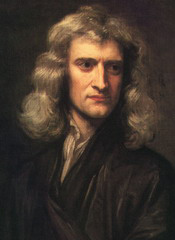On January 4th, 1643, an amazing man was born. One night in 1654, some townspeople in Graham, England, became frightened because of a strange light flying back in forth in the sky. Some thought they were watching a crazy comet. Many people in those days were superstitious, so it wouldn't be surprising to imagine them freaking out!
But the light was not a comet. It was merely a torch on the back of a kite made by young 12 year-old Isaac Newton. As a schoolboy, Isaac spent much of his time trying new experiments and making models of mechanical things he read about or watched being used. Isn't that interesting?
One time, he even created a tiny windmill that could grind small amounts of corn! He trained a mouse to run the mill to show people how it worked. Already, as a young boy, he was intriguing.
But it didn't end there. When he was sixteen, he left school for a while to help his mother back at the farm. But his overwhelming curiosity about the world made him convince his mom that he needed to go back to school; so he went back to town to further his studies. After, he went to Cambridge University to study science and mathematics.
In one of Isaac's classes, a professor taught the common notion that sunlight was colorless. (Kind of weird thinking for us now, eh?) But Isaac had a different perception.
Eventually, he held a prism to the sunlight streaming from his window, and noticed a a rainbow of colors sparkling across his wall. How could colorless light create rainbows? This was an extraordinary question, and I believe that he was determined to find out why. He studied it, of course, and he concluded that sunlight contained a whole spectrum of 'invisible' colors in plain light. He wrote a paper proving his theory. This paper was read with interest by the scientists in the Royal Society, a special group containing the greatest minds of England.
Isaac Newton was elected to become a member of this society a few years later after he developed a new kind of telescope called the Newtonian Reflector. Isaac Newton also discovered much about the laws of motion and gravity. He even wrote a book on it, "Principia Mathematica". Strange name, but good book. I think that it means 'principle mathematics'. But how can I know?
Newton was also a strong believer in Christ; he even said:
"This most beautiful system of sun, planets, and comets could only proceed from the counsel and domination of an intelligent and powerful Being . . . This Being governs all things, not as the soul of the world, but as the Lord of all."
Sir Isaac Newton, too, discovered many other things such as gravity and optics. He learned many things including light and the sky; we must admit, this was a phenomenal man. I would go deeper into this, but I wouldn't want to make it too long to read.
In 1705, Isaac Newton became the first Englishman to be knighted for his work as a scientist. That's pretty cool. When he died in 1727, he was buried in a plot that had been reserved for a king! Can you believe it? I can hardly believe it myself.
A painting of Sir Isaac Newton.

Isaac Newton died March 31st, 1727 (at age 84). It was a sad time, but all of us die, don't we? I hope you enjoyed these interesting facts about Newton as much as I have. Farewell!
-Mylo9810
Author's Note: Sources:
http://en.wikipedia.org/wiki/Isaac_Newton
http://space.about.com/cs/astronomyhistory/a/isaacnewtonbio.htm
and various textbooks.